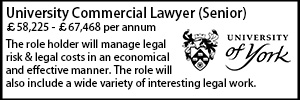SEN update
- Details
 There have been a number of important decisions regarding children with Special Educational Needs (SEN) likely to be of interest to schools and colleges. Erin Smart provides a helpful summary.
There have been a number of important decisions regarding children with Special Educational Needs (SEN) likely to be of interest to schools and colleges. Erin Smart provides a helpful summary.
The importance of the child’s views and recording education otherwise than at school in an EHC Plan
In M & M v West Sussex County Council a child, L, had been subjected to sexual exploitation and remained at risk. Professionals advised that she should be home schooled until an appropriate very specialist school placement was found. L, felt happier and safer being educated at home, and wanted this arrangement to continue.
L's parents disagreed with the EHC Plan in respect of the description of need, provision and school named, and brought a claim against the local authority. The issue was whether education otherwise than at school could be specified in a child’s EHC plan.
The Upper Tribunal said that Section I of an EHC Plan must always identify a school or type of school. This does not mean that children with an EHC Plan should never have the option of education outside school. Instead, this can be listed in Section F, if:
- the ultimate aim is for the child to be educated in school; or
- the child receives a package where some education is provided in a school and some is provided outside of school.
It also said that the First Tier Tribunal must expressly deal with the child’s views, wishes and feelings.
When should an EHC needs assessment be undertaken?
In RB v Calderdale MBC a child, R, had a medical condition which caused him to miss a significant amount of school. The local authority refused his parents request for an EHC needs assessment and his parents brought proceedings against it.
The First Tier Tribunal considered that R’s needs were medical and agreed with the LA.
However, the Upper Tribunal said this decision was incorrect. It said that R had a disability which potentially hindered him from making use of facilities provided for others of the same age in mainstream schools and as such, the LA did have to consider whether a EHC plan might be appropriate here. In other words, the LA could not reject the parent's request without properly considering all of the evidence.
This means that special educational provision should also be viewed through the prism of disability rather than only in respect of learning difficulties.
School performance tables and special education needs units attached to mainstream schools
In Governing Body of Lark Hall Primary School v Secretary of State for Education, 33 pupils attended a special unit for autistic children which operated as a "school within a school". Ten percent of these pupils didn't take any lessons in the mainstream school. There were separate admittance times, a separate entrance and building, a modified curriculum and none of the children did SATs.
The schools performance tables included the attainment and progress data of the pupils in the special unit. The school was unhappy about this because it deflated its attainment rate. It argued that this sent out an incomplete and misleading picture to parents, prospective parents and the wider community at large. It was also worried that including this data meant the school was at risk of being classed as a “coasting” school for the purposes of DfE and related regulatory control.
The school took action to exclude the data from the special unit from its scores.
The Upper Tribunal concluded that, as special units have no separate legal status, and take a variety of forms, it was not appropriate to exclude the data as it would result in this data set being missed entirely from the record. It also said that the data included in performance tables had to apply a transparent set of rules capable of uniform application on a national basis. Therefore, the application was refused.
Parental conduct during a Tribunal
In SG v Denbighshire County Council and MB Mr S-G had appealed to the First Tier Tribunal against his daughter’s Statement of SEN. He had not, however, detailed the reasons for his appeal, the changes he was seeking in respect of the contents nor the school he was seeking to name.
Despite this, the First Tier Tribunal did amend the contents of the Statement of SEN. As there was no way for the First Tier Tribunal to compare the schools, they ordered a type of school be specified in the plan. Mr S-G sought permission to appeal the decision.
The application was refused for a number of reasons, including Mr S-G's behaviour which was described by the Upper Tribunal, as absurd and offensive. It included letters from Mr S-G referring to:
- Local authority officers as “lying idiots”
- Ms B as “uneducated”
- the Chair being “clueless”
- the President being “childish” and “a joker”
- the Tribunal President being “pathetic” and suggesting he should “grow up”; and
- Accusing the Tribunal of gender discrimination
Decisions in relation to unsuccessful applications to appeal are not normally published. Here, the Upper Tribunal decided to do so to highlight the inappropriate way the parent conducted himself and to send out a message that everyone involved in the process must behave in a professional way.
It is important to keep the child at heart of proceedings and this is most effective when both sides work together to progress the case.
Erin Smart is an education solicitor at Irwin Mitchell. She can be contacted on 0370 1500 100.








































